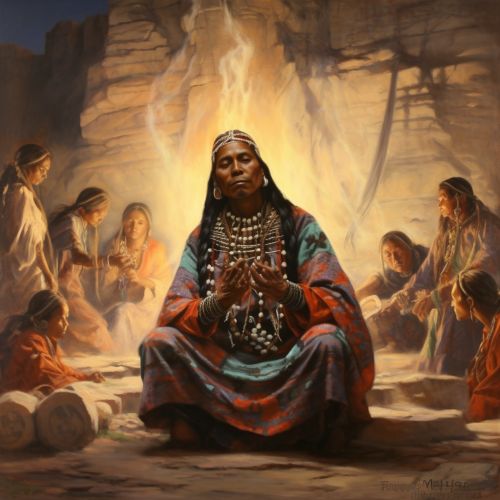Shamanism
Introduction
Shamanism is a religious practice that involves a practitioner, a Shaman, who is believed to interact with a spirit world through altered states of consciousness, such as trance. The goal of this interaction is to direct these spirits or spiritual energies into the physical world, for healing or some other purpose. Shamanism is based on the premise that the visible world is pervaded by invisible forces or spirits that affect the lives of the living.


History and Origins
Shamanism is thought to be one of the oldest forms of spiritual practice, with roots dating back tens of thousands of years. It is believed to have originated in the Paleolithic period, and possibly even earlier. Shamanistic practices are found in the indigenous cultures of Siberia, Asia, Africa, Australia, and the Americas. The term "shaman" originates from the Tungusic peoples of Siberia and is often used interchangeably with "medicine man" or "spiritual healer" in other cultures.
Beliefs and Practices
Shamanistic beliefs and practices vary widely among different cultures, but there are several common elements. Most notably, shamans are believed to be able to communicate with the spirit world, often through a trance state. They may use various methods to achieve this state, including rhythmic drumming, dancing, fasting, or the use of entheogenic substances.
Shamans often serve as intermediaries between the human world and the spirit world. They may perform a variety of functions, depending on their specific culture and role. These can include healing, divination, soul retrieval, guiding the spirits of the deceased, and controlling weather.
Shamanic Healing
Shamanic healing is perhaps the most well-known aspect of shamanism. Shamans are often called upon to heal illness, which they do by restoring the balance between the individual and the spiritual forces that affect them. This may involve the removal of unwanted energies or spirits, the retrieval of lost soul parts, or the infusion of healing spiritual energy.


Shamanism in Modern Times
In recent decades, there has been a resurgence of interest in shamanism in Western societies. This has been driven in part by a growing recognition of the value of indigenous wisdom and spiritual practices, as well as a desire for more holistic and integrative approaches to health and wellbeing. Today, many people in the West engage in shamanic practices or seek out the services of shamans for healing, personal growth, and spiritual development.
Criticisms and Controversies
Shamanism is not without its critics and controversies. Some anthropologists and religious scholars have questioned the validity of using the term "shamanism" to describe a wide range of diverse spiritual practices. Others have criticized the commercialization and appropriation of shamanic practices by Westerners, arguing that it often involves a superficial understanding and respect for the cultural context in which these practices originate.
